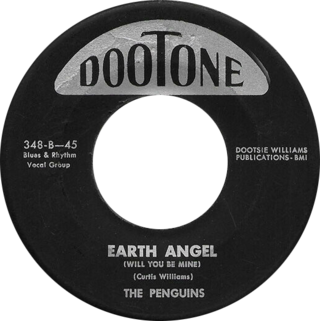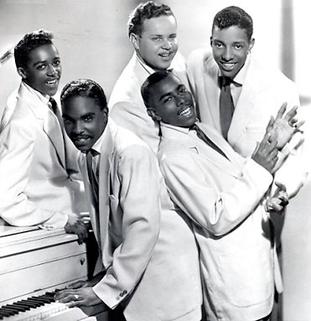Related Research Articles

Doo-wop is a genre of rhythm and blues music that originated in African-American communities during the 1940s, mainly in the large cities of the United States, including New York, Philadelphia, Pittsburgh, Chicago, Baltimore, Newark, Detroit, Washington, DC, and Los Angeles. It features vocal group harmony that carries an engaging melodic line to a simple beat with little or no instrumentation. Lyrics are simple, usually about love, sung by a lead vocal over background vocals, and often featuring, in the bridge, a melodramatically heartfelt recitative addressed to the beloved. Harmonic singing of nonsense syllables is a common characteristic of these songs. Gaining popularity in the 1950s, doo-wop was "artistically and commercially viable" until the early 1960s, but continued to influence performers in other genres.

The Flamingos are an American doo-wop group formed in Chicago in 1953. The band became popular in mid-to-late 1950s and are known for their 1959 cover version of "I Only Have Eyes for You". They have since been hailed as one of the finest and most influential vocal groups in pop and doo wop music history. In 2001, the band was inducted into the Rock and Roll Hall of Fame.

The Dells were an American R&B vocal group. Formed in high school in 1953 by founding members Marvin Junior, Verne Allison, Johnny Funches, Chuck Barksdale, and Michael and Lucius McGill, under the name the El-Rays. They released their first recording in 1954 and two years later had their first R&B hit with "Oh What a Night". After disbanding due to a near-fatal car crash in 1958, the band reformed in 1960 with Funches being replaced by Johnny Carter. This lineup remained together until Carter's death in 2009. In 2004, The Dells were inducted into both the Rock and Roll Hall of Fame and the Vocal Group Hall of Fame. The group performed until illness forced longtime lead singer Marvin Junior and bass vocalist Chuck Barksdale into retirement, ending the group's 60-year run.

"Earth Angel", occasionally referred to as "Earth Angel (Will You Be Mine)", is a song by American doo-wop group the Penguins. Produced by Dootsie Williams, it was released as their debut single in October 1954 on Dootone Records. The Penguins had formed the year prior and recorded the song as a demo in a garage in South Central Los Angeles. The song's origins lie in multiple different sources, among them songs by Jesse Belvin, Patti Page, and the Hollywood Flames. Its authorship was the subject of a bitter legal dispute with Williams in the years following its release.
The Wrens were an American doo-wop vocal group from The Bronx, New York City. They are best known for their song "Come Back My Love".

The Del-Vikings were an American doo-wop musical group that recorded several hit singles in the 1950s and continued to record and tour with various lineups in later decades. The group is notable for the hit songs "Come Go with Me" and "Whispering Bells", and for having been a successful racially mixed musical group during a period of time when such groups were rare.
Doo Wop 50 was a PBS pledge drive special created and produced for PBS member station WQED-TV by TJ Lubinsky, grandson of Herman Lubinsky. The special was inspired by a 1994 CD box-set of doo wop music produced and sold by Rhino Records, which was also a development and production partner in the special. It aired on December 5, 1999.

"Sh-Boom " is an early doo-wop song by the R&B vocal group The Chords. It was written by James Keyes, Claude Feaster, Carl Feaster, Floyd F. McRae, and William Edwards, members of The Chords, and published in 1954. It is sometimes considered the first doo-wop or rock 'n' roll record to reach the top ten on the pop charts, as it was a top-10 hit that year for both the Chords and The Crew-Cuts. In 2004, it was ranked No. 215 on Rolling Stone's "Top 500 Best Songs of All Time".

"Gee", is a song by American R&B and Doo-wop group the Crows, released in June 1953. The song has been credited as the first rock and roll hit by a rock and roll group. It is a doo-wop song, written by William Davis and Viola Watkins, and recorded by the Crows on the independent label, Rama Records, at Beltone Studios in New York City in February 1953. It charted in April 1954, one year later. It took a year to get recognized on Your Hit Parade. It landed No.2 on the rhythm and blues chart and No. 14 on the pop chart. It was the first 1950s doo-wop record to sell over one million records. Recorded on an independent label, it was one of the first such R&B records to crossover to the wider pop market. In fact, some, including Jay Warner, consider it as the first of the "rock n' roll records".
The Danleers were an American doo-wop group formed in Brooklyn, New York in 1958. The group's original and most famous lineup consisted of Jimmy Weston, Johnny Lee, Willie Ephraim, Nat McCune, and Roosevelt Mays. One of many streetcorner vocal groups in Brooklyn, they rose to prominence in 1958 on the strength of the single "One Summer Night", written by their manager, Danny Webb, who also named the group. The single was one of the biggest hits of that year and sold over one million copies. Further releases were not so successful and the group mostly dissolved by the mid-1960s. It continued to tour for several decades with Weston as the main original member.
The Charts were an American doo-wop group of the 1950s, most famous for their recording "Deserie".

The Solitaires are an American doo-wop group, best known for their 1957 hit single "Walking Along". Although they never had a national chart hit, they were one of the most popular vocal groups in New York in the late 1950s.
Fee Bee Records was a record label started by Joe Averbach in Pittsburgh, Pennsylvania. The label is notable for recording The Del-Vikings hit "Come Go With Me" in 1957. Other Del-Viking songs recorded on the Fee Bee label include "How Can I Find True Love," "Whispering Bells", "I'm Spinning", and "You Say You Love Me." "Come Go With Me" was quickly released to Dot Records for national distribution in late January 1957, followed by "Whispering Bells" and "I'm Spinning" in May and August 1957.
Pat J. DiCesare Sr. is an American entrepreneur and rock concert promoter, whose career began at the early stages of rock and roll. His career in the music industry spanned the latter half of the 20th century, and his Pittsburgh-based company, DiCesare Engler Productions, was at one time one of the top-grossing businesses amongst US concert promoters.

Lillian Leach, also known by her married name, Lillian Leach Boyd, was an American singer who performed lead vocals with the Bronx-based doo-wop group the Mellows. She was noted for her mellifluous voice and wistful singing style. The Mellows recorded several hit songs in the 1950s, including "Smoke From Your Cigarette", "Yesterday's Memories", and "How Sentimental Can I Be?"
The Charades is a doo-wop, r&b group which was mostly active in California in the early to mid-1960s and has released a number of singles on various labels. One of the songs it recorded, which was associated with the surf genre, was "Surf 'n Stomp" on the Northridge label. The band also recorded for Tony Hilder's Impact label, and even had a release on a label owned by Fred Astaire. They had a minor hit with "Please Be My Love Tonight". The group, though it has been through some changes, still continues today, and has a history that spans six decades.

The Four Fellows were an American doo-wop group formed in Brooklyn, New York, in 1953. The combo possessed a more polished and professional style than much of their regional contemporaries, reflecting upon influences from gospel and barbershop music. In the Four Fellows' recording career, they underwent multiple line-up changes with lead singer Jimmy McGowan remaining the sole consistent member of the group until it disbanded in 1956. The group released several singles, but their one and only national hit came in 1955, with the distribution of "Soldier Boy", a Top 10 song on the Billboard R&B charts.

The Willows are an American doo-wop group formed in Harlem, New York, in 1952. The group was an influential musical act that performed into the mid-1960s and had a Top 20 R&B hit with "Church Bells May Ring", a song which was covered with greater commercial success by The Diamonds.

The Marquees were an American doo-wop group formed in Washington, D.C., United States, in 1957. Evolving from the former group the Rainbows, the Marquees included Marvin Gaye and backed musicians such as Bo Diddley and Billy Stewart. The group also recorded as the New Moonglows with singer Harvey Fuqua.

"Whispering Bells" is a song performed by The Del-Vikings. It reached #5 on the U.S. R&B chart and #9 on the U.S. pop chart in 1957. Kripp Johnson was the lead vocalist on this recording. Clarence E. Quick, who was the bass vocalist in the group, wrote the song.
References
- ↑ "Songs Composed by Pat Dicesare". Allmusic . Retrieved 13 December 2009.
- 1 2 Warner, Jay (2006). American Singing Groups: a History from 1940 to Today . Hal Leonard Corporation. pp. 149–152. ISBN 9780634099786 . Retrieved 13 December 2009.
american singing groups.
- ↑ DiCesare, Pat (11 October 2009). "My entry into the music biz ... a hit with the Dell Vikings". Pittsburgh Post-Gazette . Retrieved 13 December 2009.
- ↑ "I'm Spinning". Allmusic . Retrieved 2011-08-24.
- ↑ "Overview—Coolshake: The Very Best of the Del-Vikings". Allmusic . Retrieved 13 December 2009.
- ↑ "Biography—The Del Vikings". Allmusic . Retrieved 13 December 2009.